Evidence-Based Nursing: Analysis of Benefits, Challenges & Impact
VerifiedAdded on 2023/06/11
|7
|2005
|433
Report
AI Summary
This report provides a comprehensive analysis of evidence-based practice (EBP) in nursing, highlighting its significance in enhancing healthcare quality and patient outcomes. It discusses how EBP integrates research findings, clinical expertise, and patient values to improve nursing care. The report examines the increasing adoption of EBP in nursing, with statistics indicating a substantial percentage of nursing practices being research-based. It also explores the advantages of EBP, such as improved decision-making, enhanced patient recovery, and the promotion of cost-effectiveness. Furthermore, the report addresses challenges associated with EBP implementation, including time constraints and the need for valid, credible evidence. The conclusion emphasizes the vital role of EBP in nursing and its potential to impact patient care positively, while also acknowledging the challenges that nurses face in adopting and implementing evidence-based practices.
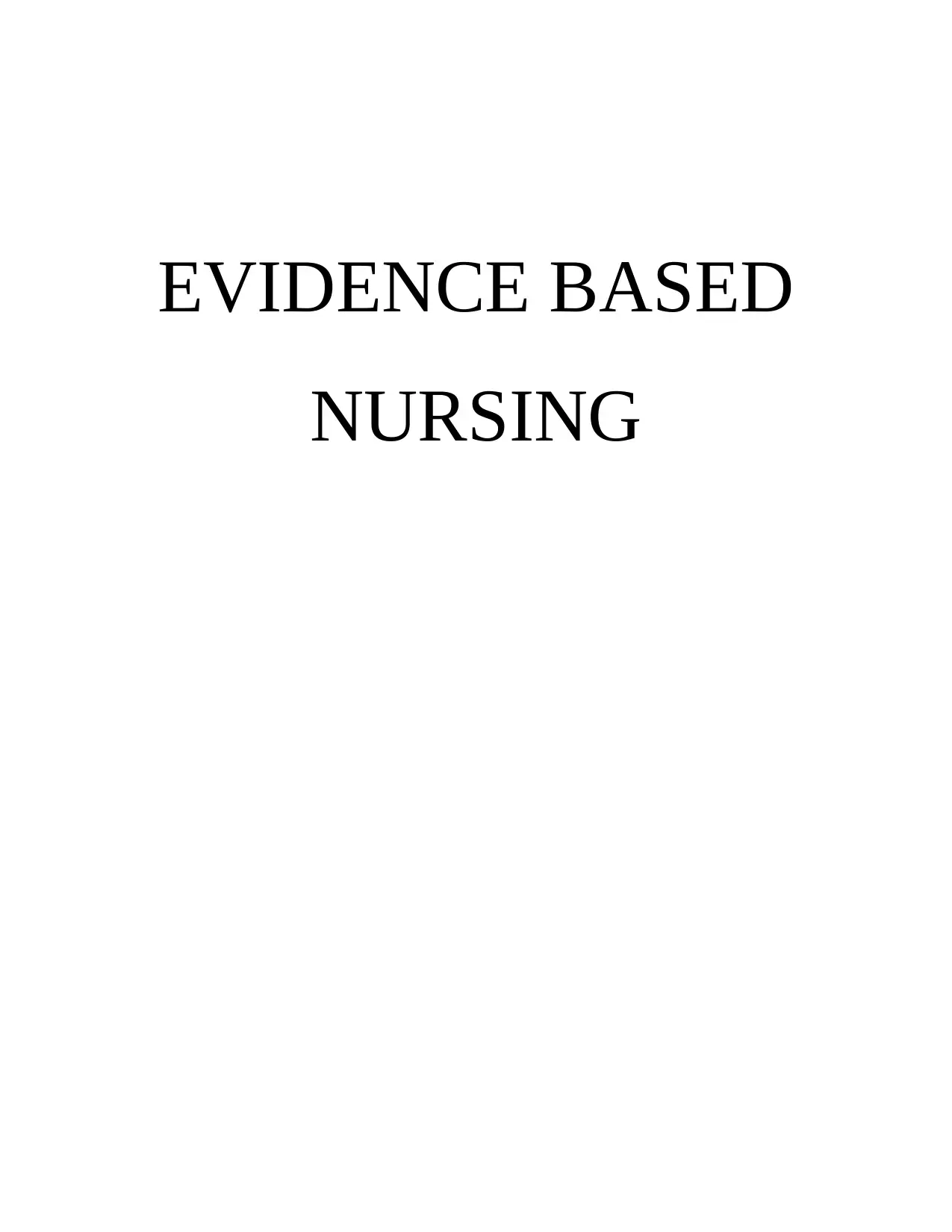
EVIDENCE BASED
NURSING
NURSING
Paraphrase This Document
Need a fresh take? Get an instant paraphrase of this document with our AI Paraphraser
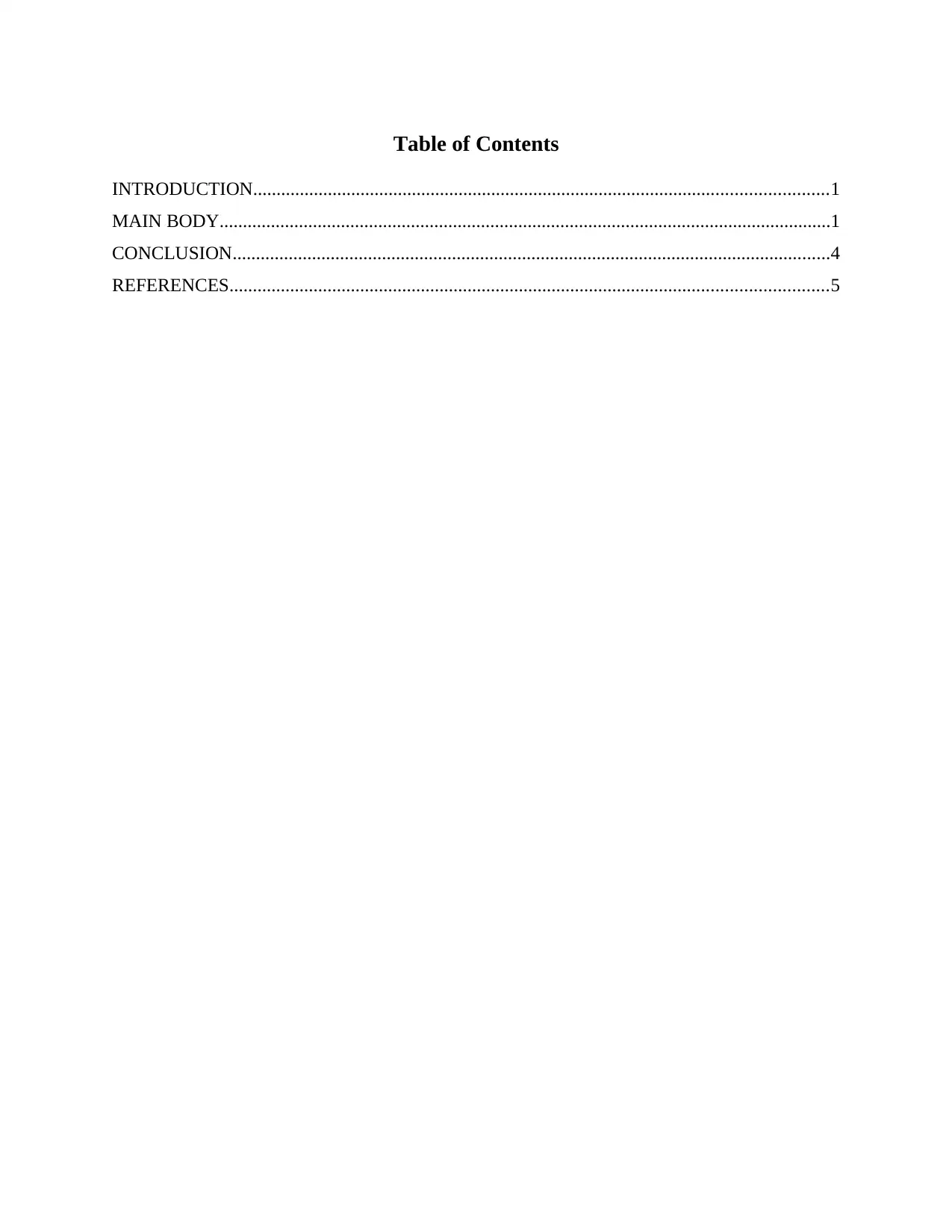
Table of Contents
INTRODUCTION...........................................................................................................................1
MAIN BODY...................................................................................................................................1
CONCLUSION................................................................................................................................4
REFERENCES................................................................................................................................5
INTRODUCTION...........................................................................................................................1
MAIN BODY...................................................................................................................................1
CONCLUSION................................................................................................................................4
REFERENCES................................................................................................................................5
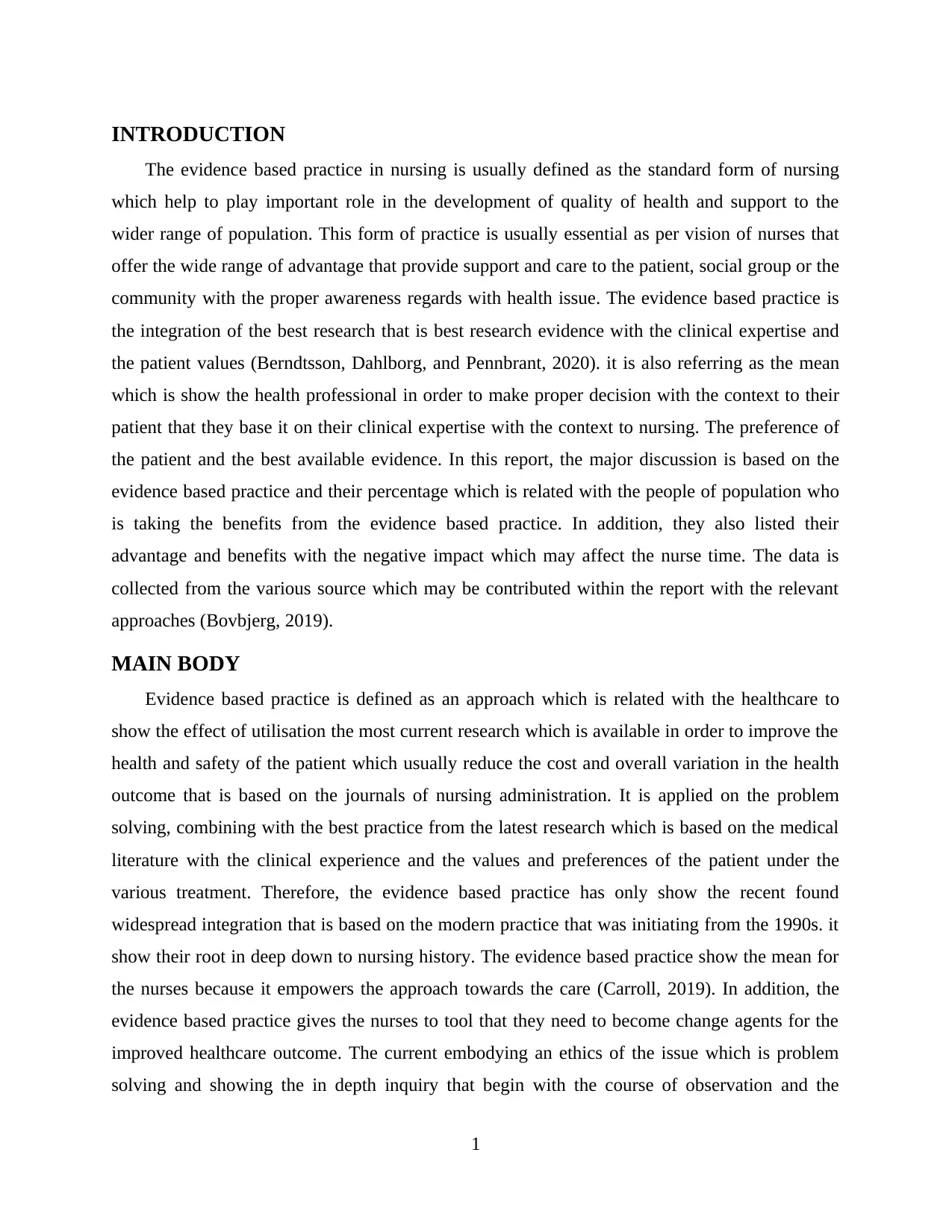
INTRODUCTION
The evidence based practice in nursing is usually defined as the standard form of nursing
which help to play important role in the development of quality of health and support to the
wider range of population. This form of practice is usually essential as per vision of nurses that
offer the wide range of advantage that provide support and care to the patient, social group or the
community with the proper awareness regards with health issue. The evidence based practice is
the integration of the best research that is best research evidence with the clinical expertise and
the patient values (Berndtsson, Dahlborg, and Pennbrant, 2020). it is also referring as the mean
which is show the health professional in order to make proper decision with the context to their
patient that they base it on their clinical expertise with the context to nursing. The preference of
the patient and the best available evidence. In this report, the major discussion is based on the
evidence based practice and their percentage which is related with the people of population who
is taking the benefits from the evidence based practice. In addition, they also listed their
advantage and benefits with the negative impact which may affect the nurse time. The data is
collected from the various source which may be contributed within the report with the relevant
approaches (Bovbjerg, 2019).
MAIN BODY
Evidence based practice is defined as an approach which is related with the healthcare to
show the effect of utilisation the most current research which is available in order to improve the
health and safety of the patient which usually reduce the cost and overall variation in the health
outcome that is based on the journals of nursing administration. It is applied on the problem
solving, combining with the best practice from the latest research which is based on the medical
literature with the clinical experience and the values and preferences of the patient under the
various treatment. Therefore, the evidence based practice has only show the recent found
widespread integration that is based on the modern practice that was initiating from the 1990s. it
show their root in deep down to nursing history. The evidence based practice show the mean for
the nurses because it empowers the approach towards the care (Carroll, 2019). In addition, the
evidence based practice gives the nurses to tool that they need to become change agents for the
improved healthcare outcome. The current embodying an ethics of the issue which is problem
solving and showing the in depth inquiry that begin with the course of observation and the
1
The evidence based practice in nursing is usually defined as the standard form of nursing
which help to play important role in the development of quality of health and support to the
wider range of population. This form of practice is usually essential as per vision of nurses that
offer the wide range of advantage that provide support and care to the patient, social group or the
community with the proper awareness regards with health issue. The evidence based practice is
the integration of the best research that is best research evidence with the clinical expertise and
the patient values (Berndtsson, Dahlborg, and Pennbrant, 2020). it is also referring as the mean
which is show the health professional in order to make proper decision with the context to their
patient that they base it on their clinical expertise with the context to nursing. The preference of
the patient and the best available evidence. In this report, the major discussion is based on the
evidence based practice and their percentage which is related with the people of population who
is taking the benefits from the evidence based practice. In addition, they also listed their
advantage and benefits with the negative impact which may affect the nurse time. The data is
collected from the various source which may be contributed within the report with the relevant
approaches (Bovbjerg, 2019).
MAIN BODY
Evidence based practice is defined as an approach which is related with the healthcare to
show the effect of utilisation the most current research which is available in order to improve the
health and safety of the patient which usually reduce the cost and overall variation in the health
outcome that is based on the journals of nursing administration. It is applied on the problem
solving, combining with the best practice from the latest research which is based on the medical
literature with the clinical experience and the values and preferences of the patient under the
various treatment. Therefore, the evidence based practice has only show the recent found
widespread integration that is based on the modern practice that was initiating from the 1990s. it
show their root in deep down to nursing history. The evidence based practice show the mean for
the nurses because it empowers the approach towards the care (Carroll, 2019). In addition, the
evidence based practice gives the nurses to tool that they need to become change agents for the
improved healthcare outcome. The current embodying an ethics of the issue which is problem
solving and showing the in depth inquiry that begin with the course of observation and the
1
⊘ This is a preview!⊘
Do you want full access?
Subscribe today to unlock all pages.

Trusted by 1+ million students worldwide
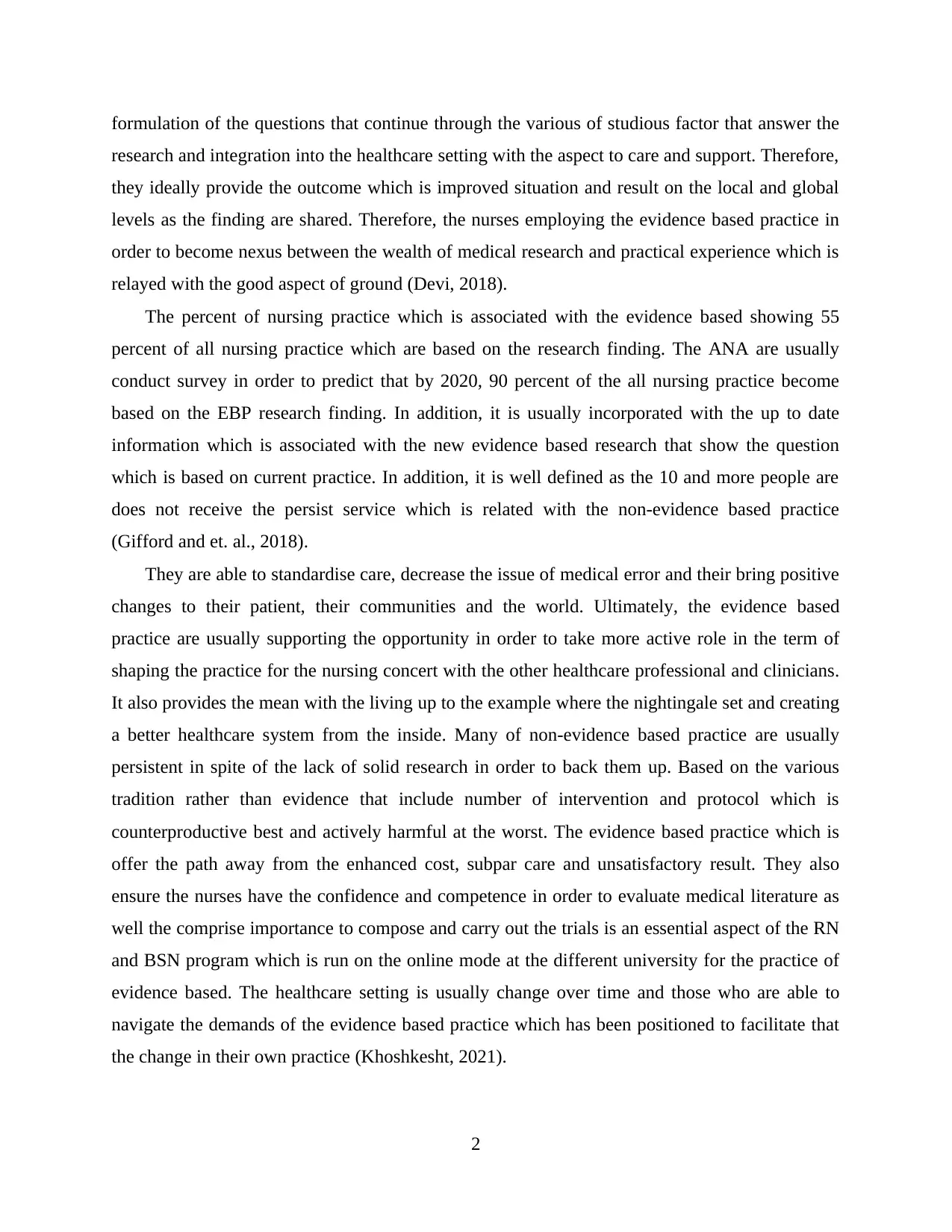
formulation of the questions that continue through the various of studious factor that answer the
research and integration into the healthcare setting with the aspect to care and support. Therefore,
they ideally provide the outcome which is improved situation and result on the local and global
levels as the finding are shared. Therefore, the nurses employing the evidence based practice in
order to become nexus between the wealth of medical research and practical experience which is
relayed with the good aspect of ground (Devi, 2018).
The percent of nursing practice which is associated with the evidence based showing 55
percent of all nursing practice which are based on the research finding. The ANA are usually
conduct survey in order to predict that by 2020, 90 percent of the all nursing practice become
based on the EBP research finding. In addition, it is usually incorporated with the up to date
information which is associated with the new evidence based research that show the question
which is based on current practice. In addition, it is well defined as the 10 and more people are
does not receive the persist service which is related with the non-evidence based practice
(Gifford and et. al., 2018).
They are able to standardise care, decrease the issue of medical error and their bring positive
changes to their patient, their communities and the world. Ultimately, the evidence based
practice are usually supporting the opportunity in order to take more active role in the term of
shaping the practice for the nursing concert with the other healthcare professional and clinicians.
It also provides the mean with the living up to the example where the nightingale set and creating
a better healthcare system from the inside. Many of non-evidence based practice are usually
persistent in spite of the lack of solid research in order to back them up. Based on the various
tradition rather than evidence that include number of intervention and protocol which is
counterproductive best and actively harmful at the worst. The evidence based practice which is
offer the path away from the enhanced cost, subpar care and unsatisfactory result. They also
ensure the nurses have the confidence and competence in order to evaluate medical literature as
well the comprise importance to compose and carry out the trials is an essential aspect of the RN
and BSN program which is run on the online mode at the different university for the practice of
evidence based. The healthcare setting is usually change over time and those who are able to
navigate the demands of the evidence based practice which has been positioned to facilitate that
the change in their own practice (Khoshkesht, 2021).
2
research and integration into the healthcare setting with the aspect to care and support. Therefore,
they ideally provide the outcome which is improved situation and result on the local and global
levels as the finding are shared. Therefore, the nurses employing the evidence based practice in
order to become nexus between the wealth of medical research and practical experience which is
relayed with the good aspect of ground (Devi, 2018).
The percent of nursing practice which is associated with the evidence based showing 55
percent of all nursing practice which are based on the research finding. The ANA are usually
conduct survey in order to predict that by 2020, 90 percent of the all nursing practice become
based on the EBP research finding. In addition, it is usually incorporated with the up to date
information which is associated with the new evidence based research that show the question
which is based on current practice. In addition, it is well defined as the 10 and more people are
does not receive the persist service which is related with the non-evidence based practice
(Gifford and et. al., 2018).
They are able to standardise care, decrease the issue of medical error and their bring positive
changes to their patient, their communities and the world. Ultimately, the evidence based
practice are usually supporting the opportunity in order to take more active role in the term of
shaping the practice for the nursing concert with the other healthcare professional and clinicians.
It also provides the mean with the living up to the example where the nightingale set and creating
a better healthcare system from the inside. Many of non-evidence based practice are usually
persistent in spite of the lack of solid research in order to back them up. Based on the various
tradition rather than evidence that include number of intervention and protocol which is
counterproductive best and actively harmful at the worst. The evidence based practice which is
offer the path away from the enhanced cost, subpar care and unsatisfactory result. They also
ensure the nurses have the confidence and competence in order to evaluate medical literature as
well the comprise importance to compose and carry out the trials is an essential aspect of the RN
and BSN program which is run on the online mode at the different university for the practice of
evidence based. The healthcare setting is usually change over time and those who are able to
navigate the demands of the evidence based practice which has been positioned to facilitate that
the change in their own practice (Khoshkesht, 2021).
2
Paraphrase This Document
Need a fresh take? Get an instant paraphrase of this document with our AI Paraphraser
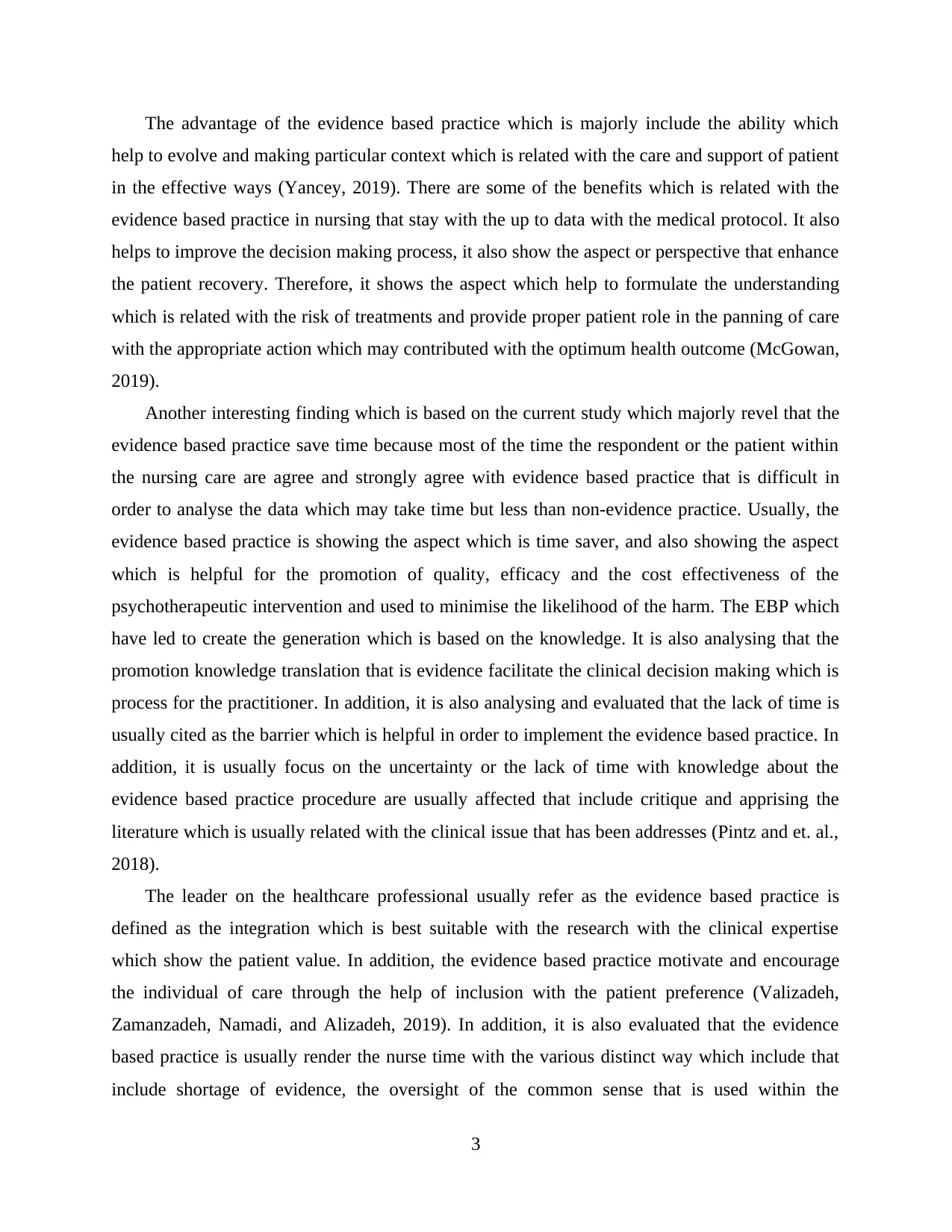
The advantage of the evidence based practice which is majorly include the ability which
help to evolve and making particular context which is related with the care and support of patient
in the effective ways (Yancey, 2019). There are some of the benefits which is related with the
evidence based practice in nursing that stay with the up to data with the medical protocol. It also
helps to improve the decision making process, it also show the aspect or perspective that enhance
the patient recovery. Therefore, it shows the aspect which help to formulate the understanding
which is related with the risk of treatments and provide proper patient role in the panning of care
with the appropriate action which may contributed with the optimum health outcome (McGowan,
2019).
Another interesting finding which is based on the current study which majorly revel that the
evidence based practice save time because most of the time the respondent or the patient within
the nursing care are agree and strongly agree with evidence based practice that is difficult in
order to analyse the data which may take time but less than non-evidence practice. Usually, the
evidence based practice is showing the aspect which is time saver, and also showing the aspect
which is helpful for the promotion of quality, efficacy and the cost effectiveness of the
psychotherapeutic intervention and used to minimise the likelihood of the harm. The EBP which
have led to create the generation which is based on the knowledge. It is also analysing that the
promotion knowledge translation that is evidence facilitate the clinical decision making which is
process for the practitioner. In addition, it is also analysing and evaluated that the lack of time is
usually cited as the barrier which is helpful in order to implement the evidence based practice. In
addition, it is usually focus on the uncertainty or the lack of time with knowledge about the
evidence based practice procedure are usually affected that include critique and apprising the
literature which is usually related with the clinical issue that has been addresses (Pintz and et. al.,
2018).
The leader on the healthcare professional usually refer as the evidence based practice is
defined as the integration which is best suitable with the research with the clinical expertise
which show the patient value. In addition, the evidence based practice motivate and encourage
the individual of care through the help of inclusion with the patient preference (Valizadeh,
Zamanzadeh, Namadi, and Alizadeh, 2019). In addition, it is also evaluated that the evidence
based practice is usually render the nurse time with the various distinct way which include that
include shortage of evidence, the oversight of the common sense that is used within the
3
help to evolve and making particular context which is related with the care and support of patient
in the effective ways (Yancey, 2019). There are some of the benefits which is related with the
evidence based practice in nursing that stay with the up to data with the medical protocol. It also
helps to improve the decision making process, it also show the aspect or perspective that enhance
the patient recovery. Therefore, it shows the aspect which help to formulate the understanding
which is related with the risk of treatments and provide proper patient role in the panning of care
with the appropriate action which may contributed with the optimum health outcome (McGowan,
2019).
Another interesting finding which is based on the current study which majorly revel that the
evidence based practice save time because most of the time the respondent or the patient within
the nursing care are agree and strongly agree with evidence based practice that is difficult in
order to analyse the data which may take time but less than non-evidence practice. Usually, the
evidence based practice is showing the aspect which is time saver, and also showing the aspect
which is helpful for the promotion of quality, efficacy and the cost effectiveness of the
psychotherapeutic intervention and used to minimise the likelihood of the harm. The EBP which
have led to create the generation which is based on the knowledge. It is also analysing that the
promotion knowledge translation that is evidence facilitate the clinical decision making which is
process for the practitioner. In addition, it is also analysing and evaluated that the lack of time is
usually cited as the barrier which is helpful in order to implement the evidence based practice. In
addition, it is usually focus on the uncertainty or the lack of time with knowledge about the
evidence based practice procedure are usually affected that include critique and apprising the
literature which is usually related with the clinical issue that has been addresses (Pintz and et. al.,
2018).
The leader on the healthcare professional usually refer as the evidence based practice is
defined as the integration which is best suitable with the research with the clinical expertise
which show the patient value. In addition, the evidence based practice motivate and encourage
the individual of care through the help of inclusion with the patient preference (Valizadeh,
Zamanzadeh, Namadi, and Alizadeh, 2019). In addition, it is also evaluated that the evidence
based practice is usually render the nurse time with the various distinct way which include that
include shortage of evidence, the oversight of the common sense that is used within the
3
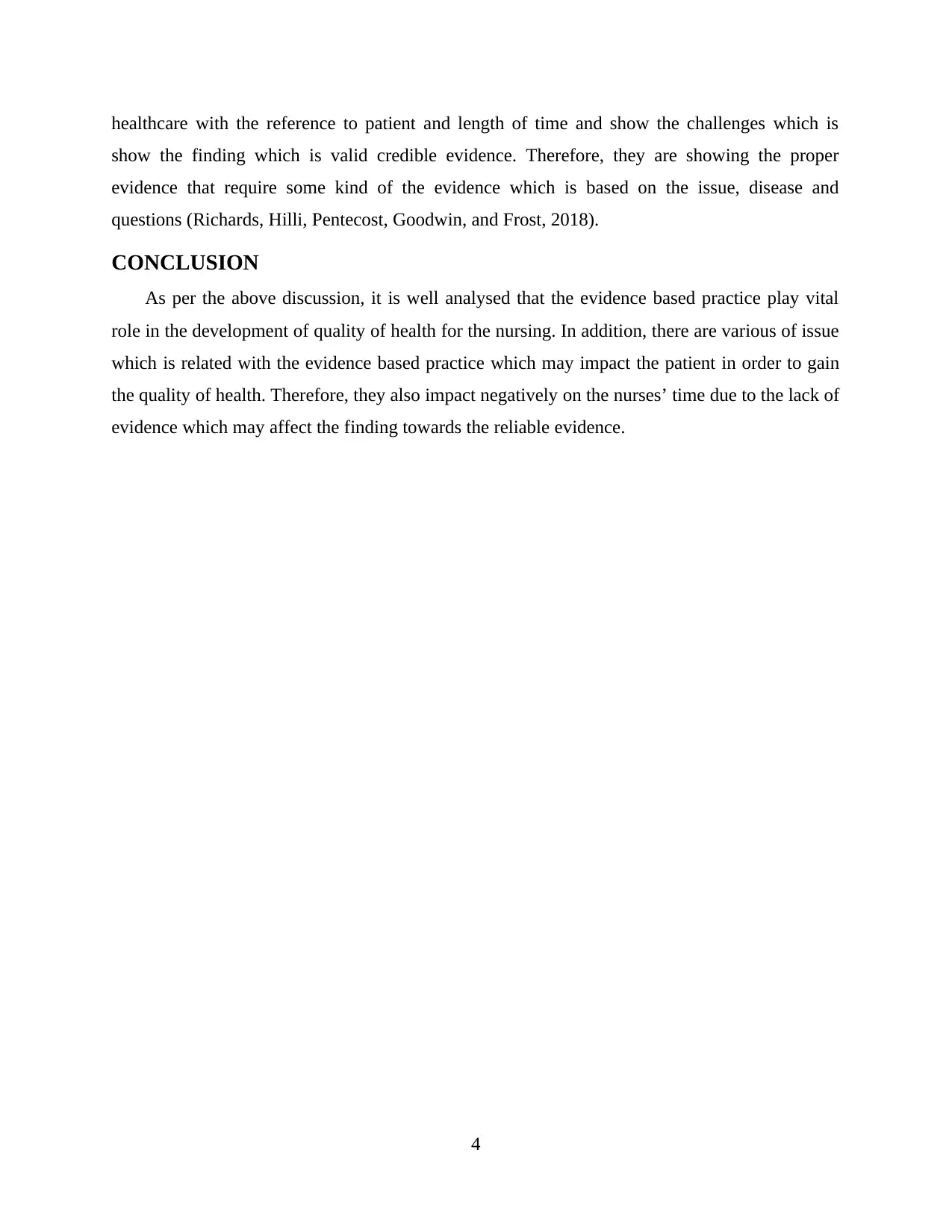
healthcare with the reference to patient and length of time and show the challenges which is
show the finding which is valid credible evidence. Therefore, they are showing the proper
evidence that require some kind of the evidence which is based on the issue, disease and
questions (Richards, Hilli, Pentecost, Goodwin, and Frost, 2018).
CONCLUSION
As per the above discussion, it is well analysed that the evidence based practice play vital
role in the development of quality of health for the nursing. In addition, there are various of issue
which is related with the evidence based practice which may impact the patient in order to gain
the quality of health. Therefore, they also impact negatively on the nurses’ time due to the lack of
evidence which may affect the finding towards the reliable evidence.
4
show the finding which is valid credible evidence. Therefore, they are showing the proper
evidence that require some kind of the evidence which is based on the issue, disease and
questions (Richards, Hilli, Pentecost, Goodwin, and Frost, 2018).
CONCLUSION
As per the above discussion, it is well analysed that the evidence based practice play vital
role in the development of quality of health for the nursing. In addition, there are various of issue
which is related with the evidence based practice which may impact the patient in order to gain
the quality of health. Therefore, they also impact negatively on the nurses’ time due to the lack of
evidence which may affect the finding towards the reliable evidence.
4
⊘ This is a preview!⊘
Do you want full access?
Subscribe today to unlock all pages.

Trusted by 1+ million students worldwide
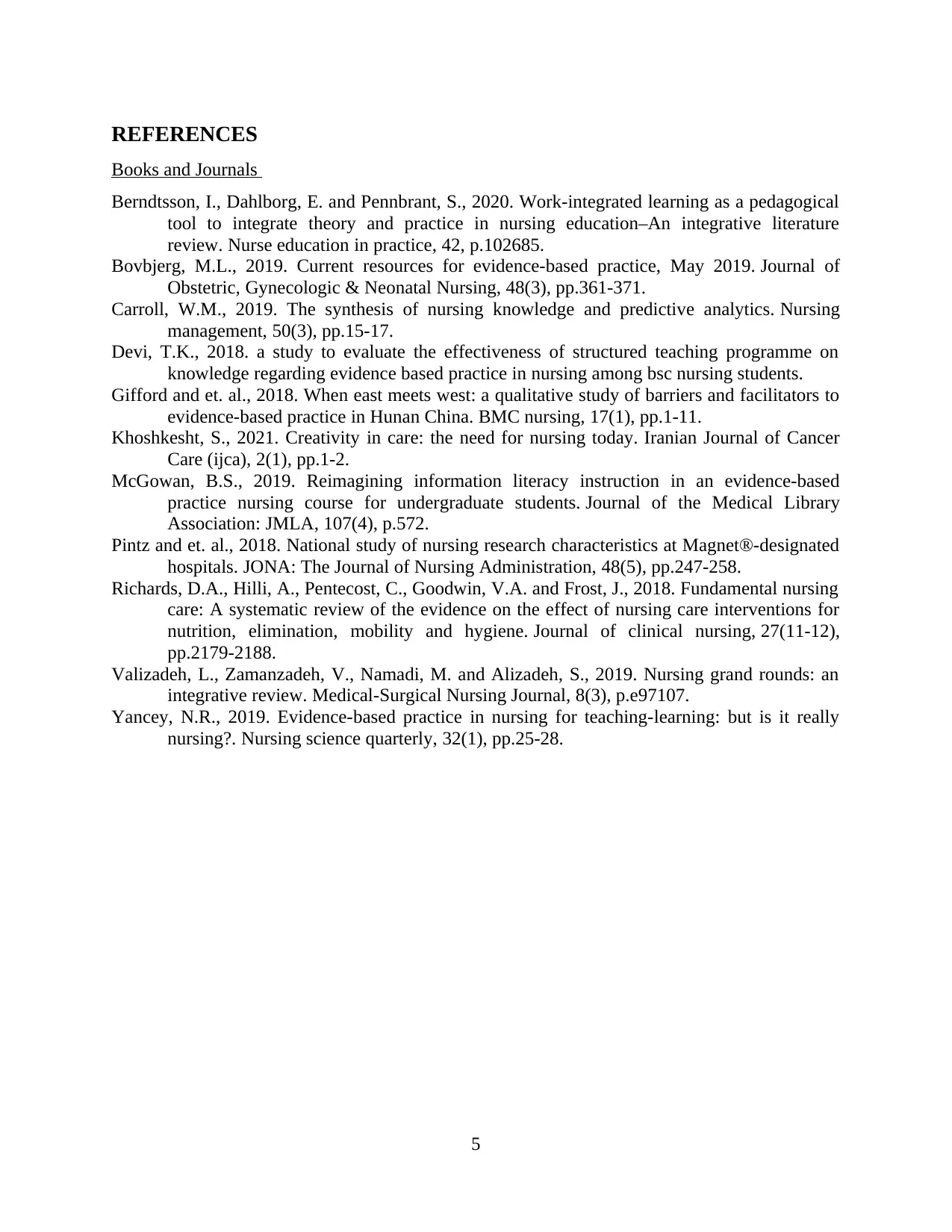
REFERENCES
Books and Journals
Berndtsson, I., Dahlborg, E. and Pennbrant, S., 2020. Work-integrated learning as a pedagogical
tool to integrate theory and practice in nursing education–An integrative literature
review. Nurse education in practice, 42, p.102685.
Bovbjerg, M.L., 2019. Current resources for evidence-based practice, May 2019. Journal of
Obstetric, Gynecologic & Neonatal Nursing, 48(3), pp.361-371.
Carroll, W.M., 2019. The synthesis of nursing knowledge and predictive analytics. Nursing
management, 50(3), pp.15-17.
Devi, T.K., 2018. a study to evaluate the effectiveness of structured teaching programme on
knowledge regarding evidence based practice in nursing among bsc nursing students.
Gifford and et. al., 2018. When east meets west: a qualitative study of barriers and facilitators to
evidence-based practice in Hunan China. BMC nursing, 17(1), pp.1-11.
Khoshkesht, S., 2021. Creativity in care: the need for nursing today. Iranian Journal of Cancer
Care (ijca), 2(1), pp.1-2.
McGowan, B.S., 2019. Reimagining information literacy instruction in an evidence-based
practice nursing course for undergraduate students. Journal of the Medical Library
Association: JMLA, 107(4), p.572.
Pintz and et. al., 2018. National study of nursing research characteristics at Magnet®-designated
hospitals. JONA: The Journal of Nursing Administration, 48(5), pp.247-258.
Richards, D.A., Hilli, A., Pentecost, C., Goodwin, V.A. and Frost, J., 2018. Fundamental nursing
care: A systematic review of the evidence on the effect of nursing care interventions for
nutrition, elimination, mobility and hygiene. Journal of clinical nursing, 27(11-12),
pp.2179-2188.
Valizadeh, L., Zamanzadeh, V., Namadi, M. and Alizadeh, S., 2019. Nursing grand rounds: an
integrative review. Medical-Surgical Nursing Journal, 8(3), p.e97107.
Yancey, N.R., 2019. Evidence-based practice in nursing for teaching-learning: but is it really
nursing?. Nursing science quarterly, 32(1), pp.25-28.
5
Books and Journals
Berndtsson, I., Dahlborg, E. and Pennbrant, S., 2020. Work-integrated learning as a pedagogical
tool to integrate theory and practice in nursing education–An integrative literature
review. Nurse education in practice, 42, p.102685.
Bovbjerg, M.L., 2019. Current resources for evidence-based practice, May 2019. Journal of
Obstetric, Gynecologic & Neonatal Nursing, 48(3), pp.361-371.
Carroll, W.M., 2019. The synthesis of nursing knowledge and predictive analytics. Nursing
management, 50(3), pp.15-17.
Devi, T.K., 2018. a study to evaluate the effectiveness of structured teaching programme on
knowledge regarding evidence based practice in nursing among bsc nursing students.
Gifford and et. al., 2018. When east meets west: a qualitative study of barriers and facilitators to
evidence-based practice in Hunan China. BMC nursing, 17(1), pp.1-11.
Khoshkesht, S., 2021. Creativity in care: the need for nursing today. Iranian Journal of Cancer
Care (ijca), 2(1), pp.1-2.
McGowan, B.S., 2019. Reimagining information literacy instruction in an evidence-based
practice nursing course for undergraduate students. Journal of the Medical Library
Association: JMLA, 107(4), p.572.
Pintz and et. al., 2018. National study of nursing research characteristics at Magnet®-designated
hospitals. JONA: The Journal of Nursing Administration, 48(5), pp.247-258.
Richards, D.A., Hilli, A., Pentecost, C., Goodwin, V.A. and Frost, J., 2018. Fundamental nursing
care: A systematic review of the evidence on the effect of nursing care interventions for
nutrition, elimination, mobility and hygiene. Journal of clinical nursing, 27(11-12),
pp.2179-2188.
Valizadeh, L., Zamanzadeh, V., Namadi, M. and Alizadeh, S., 2019. Nursing grand rounds: an
integrative review. Medical-Surgical Nursing Journal, 8(3), p.e97107.
Yancey, N.R., 2019. Evidence-based practice in nursing for teaching-learning: but is it really
nursing?. Nursing science quarterly, 32(1), pp.25-28.
5
1 out of 7
Related Documents
Your All-in-One AI-Powered Toolkit for Academic Success.
+13062052269
info@desklib.com
Available 24*7 on WhatsApp / Email
![[object Object]](/_next/static/media/star-bottom.7253800d.svg)
Unlock your academic potential
Copyright © 2020–2026 A2Z Services. All Rights Reserved. Developed and managed by ZUCOL.





